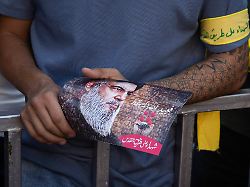Hezbollah chief chooses words carefully
Experts see escalation averted for now after Nasrallah’s speech
November 4th, 2023, 1:12 p.m
Listen to article
This audio version was artificially generated. More info | Send feedback
How does Hezbollah behave in the radical Islamic Hamas’ war with Israel? In his highly anticipated speech, Hezbollah leader Nasrallah is cautious. Political analysts believe that October 7th could also prove to be a turning point for his organization.
Hezbollah chief Hassan Nasrallah spoke out on Friday for the first time since the October 7 massacres in Israel. He praised the attacks by Islamists, in which more than 1,400 people were killed and more than 240 were taken hostage, as “wise and courageous.” At the same time, he emphasized that it was a “purely Palestinian action.” In an assessment of the speech, Pentagon spokesman Patrick S. Ryder concluded that a “broader regional conflict” in the Middle East had initially been “averted.”
Speaking to the BBC, the brigadier general said: “At the moment we see this conflict as limited between Israel and Hamas.” Hezbollah, which is closely allied with Iran, is considered an influential political force in Lebanon and significantly stronger militarily than Hamas.
Asked whether Hezbollah had been successfully deterred from entering the conflict, Ryder said: “It has been central to our government and our Department of Defense to prevent this conflict from escalating into a larger regional conflict. From this “We have deployed additional capabilities, including two U.S. aircraft carriers, to the region to provide us with a variety of options and capabilities should we need to respond to a range of contingencies.”
Ryder emphasized that the US is not seeking a conflict with Iran or even a conflict in the region as a whole. “We are focused on containing this and returning to a stable and secure region as quickly as possible.”
Disappointment for Hamas
The US think tank Washington Institute concluded his analysis Nasrallah’s speech said the Hezbollah leader not only assured the international community that Iran was not responsible for any of Hamas’s actions, but also signaled to the Hamas leadership that it was on its own. Nasrallah had said: “This is a purely Palestinian struggle and has nothing to do with regional or international affairs.”
From this the experts conclude: “Hezbollah will not take part in the war beyond the current border skirmishes, at least for the time being.” This must be disappointing for the Hamas leadership, “which will probably now feel less safe and isolated.” This could possibly even lead to Hamas being more willing to negotiate and compromise. At the same time, it is suspected that the focus of Hezbollah’s objectives has shifted from “resistance” against Israel to protecting its own interests and thus also Iran’s interests in the region.
It was also carefully noted in Washington that Nasrallah did not threaten to use Hezbollah’s weapons against US forces. It is assumed that the US military presence near Lebanon had a deterrent effect. The recent diplomatic activities of US President Joe Biden’s administration in the Middle East also “point to a longer-term determination to prevent post-war escalation.” The Hamas massacres could then also backfire on Hezbollah, according to the analysis. Many countries have come to the conclusion “that groups like Hamas and Hezbollah must be contained before another October 7th occurs.”
